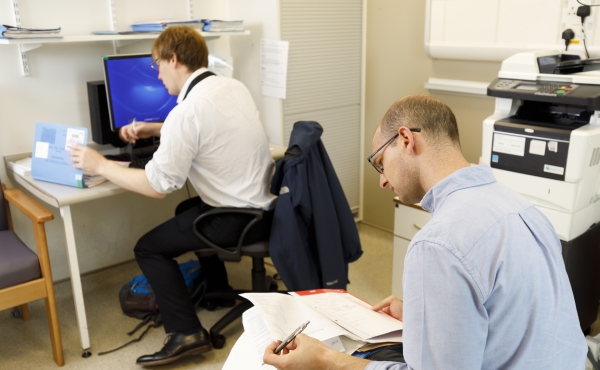Stage 3 SIA Pain Medicine Training
What is Stage 3 Special Interest Area (SIA) Pain Medicine Training?
Stage 3 SIA Pain Medicine Training - previously known as 'Advanced' Pain Training - is delivered over an indicative 12 month period in designated multi-disciplinary specialist centres where trainees are expected to undertake a wide variety of training in pain management spanning the full range of Pain Medicine treatment options and plans. This Special Interest Area training is over and above the mandatory Stage 3 training undertaken by all anaesthetics trainees.
Trainees should acquire a comprehensive knowledge of Pain Medicine service delivery as well as being able to assess a wide variety of patients with pain and becoming technically proficient in a range of procedures used in Pain Medicine.
Where does it happen?
This period of training should take place primarily within a Pain Medicine environment. It is considered unlikely that trainees who spend time outside of the Pain Medicine environment engaged in general anaesthetic duties will be able to successfully obtain all of the competencies required to complete Stage 3 SIA Pain Medicine Training. Therefore the expectation is that trainees will need to spend substantially the whole of their daytime working hours engaged in Pain Medicine-related duties. This of course would not prevent pain trainees being used on occasion to provide general anaesthetic cover for unforeseen emergency cases.
What will I learn?
Training is focused on chronic pain work and related activity including multidisciplinary team working within a pain service and developing skills in interventional Pain Medicine, reflecting the multidisciplinary practice of holistic Pain Medicine.
Stage 3 SIA Pain Medicine Training is considered essential for those aiming for a consultant appointment with sessions in pain medicine which can include a mixture of inpatient and outpatient work or outpatient work only. The Faculty of Pain Medicine recommend that those who are appointed as Lead for Acute Inpatient Pain Services should have completed this level training.
- It is recommended that trainees register with the Faculty; to register with the Faculty as a trainee, please click here.
- If you need more information on sub-specialty modules, please click here.
- For more information on recruitment to Pain Medicine, please click here.
- Guidance to Pain Training in the 2021 Anaesthetic curriculum.
Preparing for the milestones of the SIA in Pain Medicine
Contact your Training Programme Director (TPD) Regional Advisor in Pain Medicine (RAPM) and to discuss the Pain training opportunities and availability of SIA placements in your region.
Register as early as you can with the Faculty of Pain Medicine, as this will ensure you are on a training updates mailing list and connected into training activities.
Ensure you have familiarised yourself with the Stage 3 SIA Pain Medicine curriculum which sits within the CCT in Anaesthetics.
Trainees are required to maintain a pain logbook; an example of which may be found on the FPM website with links to download all the necessary software. For further information, please visit the logbook section of our assessments page.
It is also advisable to contact your Faculty Tutor (Pain) prior to starting as this will enable you to have a better knowledge of what resources are available to you and start to timetable these into your year to ‘hit the ground running’.
-
Register with the Faculty of Pain Medicine at the Royal College of Anaesthetists.
-
Familiarise yourself with the Stage 3 curriculum requirements.
-
Set up and familiarise yourself with the Faculty of Pain Medicine logbook.
-
Make contact with your new Pain Department.
During the departmental induction ensure you familiarise yourself with the location of outpatient clinics, examination rooms, theatres and associated departments (palliative care, paediatrics etc.).
It is also useful to meet the pertinent professionals in allied departments, for example physiotherapy, psychotherapy, occupational therapy, pain nurses and secretarial staff.
Meet with the College Tutor and the Faculty Tutor (Pain). Check that on call arrangements will allow you to gain maximum pain exposure. The Faculty advise that emergency anaesthetic work should not take place during normal working hours with the exception of unforeseen emergency situations.
Please see the assessments page for details of the assessments you need to complete in order to be signed off at the end of your Stage 3 SIA Pain Medicine Training. Arrange an initial meeting with your Faculty Tutor to agree a PDP.
Complete the Quarterly Assessment Review form prior to this meeting. You will also need 1 x CBD, 1 A-CEX, and 1 x DOPs assessment completed as a minimum. These can be recorded on the e-Portfolio or as paper versions which can be downloaded from the assessments page. Your logbook will be used to sign off your completion of Stage 3 SIA Pain Medicine training.
It is a requirement to have completed 6 months of the Stage 3 SIA Pain Medicine training prior to the SOE. See the FFPMRCA Examinations page for dates and details. The FFPMRCA examination is not required to complete your Stage 3 SIA Pain Medicine training and obtain your CCT in Anaesthetics. It is however, mandatory to become a full Fellow of the Faculty.
- Ensure you are familiar with the final criteria for the completion of Stage 3 SIAs in Pain Training.
- Arrange your Quarterly Review
- Ensure your logbook is up to date
- Consider when you would like to sit the FFPMRCA
By the end of your first 6 months of Stage 3 SIA Pain Medicine training you should have completed:
- 2 x A-CEX, 2 x CBD, 3 x DOPS
- 1 x MSF
- 2 x quarterly reviews – with a completed and an up to date logbook
- patient feedback - please use the Faculty's Patient Feedback Questionnaire here
You may also have sat the written part of the FFPMRCA or have considered if or when you would like to do this. The Faculty of Pain Medicine runs an Exam Tutorial Course at the RCoA twice a year to assist trainees in preparing for the exam; these are interactive days covering a wide range of topics through workshops and lectures. Trainees are expected to do some preparation for the day to encourage discussion and interactive learning. Please visit our FFPMRCA Exam Tutorials page for further information.
Visit the Examinations webpages for more information on the exam and resources.
After 9 months of Stage 3 SIA Pain Medicine Training you should have completed:
- 3 x A-CEX, 3 x CBD, 4 x DOPs, 1x A-QIPAT
- 3 x Quarterly reviews
- A completed and up to date logbook
You may also have sat the second (Structured Oral Examination) part of the FFPMRCA or have considered if or when you would like to do this.
At 11 months you should have almost completed your Stage 3 SIA Pain Medicine Training. During this month you should forward your logbook to the RAPM to check competency prior to the completion of your SIA in Pain Medicine year. Your RAPM should be able to advise on any areas you're lacking so you can rectify these before your final meeting.
Ensure that all SLEs are up to date and collated.
After 1 year you need to arrange a meeting with your RAPM to sign off your Stage 3 SIA Pain Medicine training. At this stage you should have completed:
- 4 x A-CEX (one per quarter) - all SLEs should be linked to the curriculum in the LLp
- 4 x CBD (one per quarter) - all SLEs should be linked to the curriculum in the LLp
- 6 x DOPS - all SLEs should be linked to the curriculum in the LLp
- 1 x MSF Assessment Form & Summary to be completed in the first half of training, and repeated if unsatisfactory
- 16-20 sessions of cancer pain
- all capabilities prescribed in the curriculum
- 20 patient feedback forms
- 4 Quarterly Assessment/Review (appraisal) with the Faculty Tutor (Pain)
- Logbook to be reviewed at the quarterly reviews
Now you've completed your training, you need to consider the type of department you would like to work in as a Consultant in the future. The FPM website has some guidance on Preparing for a Consulant Post, which you may find useful.
If you're not at the end of your training, you will need to think about how to maintain your Pain skills during the final part of your Anaesthetic training. The FPM has produced some guidance on this in the training FAQs section and advises that you should try to maintain at least one session in Pain Medicine per week. You should discuss this with your RAPM and TPD early to avoid rota and administrative issues.
If you have passed or are planning to pass the FFPMRCA Examination, you will become a Fellow of the Faculty on completion. Pain Medicine consultants without the exam may still join the Faculty as Affiliate Fellows. Both routes come with membership benefits that are worth investigating and will keep you connected into the wider Pain Medicine community. Please visit our Membership page for further information.
Stage 3 SIA Pain Trainee Study Days
Study days are organised by the Education Steering Group of the London Pain Training Advisory Group (LPTAG). They are open to ALL Stage 3 SIA Pain Trainees and there is no need to book in advance. If you would like any more information, please contact us: contact@fpm.ac.uk
What are the benefits of working as a Pain Medicine specialist?
- Your own practice: The opportunity to develop their own practice, seeing patients through from referral to assessment. This will include diagnostics and working longer term with patients by building a therapeutic relationship and following up outcomes.
- Multi-professional colleagues: You get to work in multi-professional teams with specialist pain nurses, psychologists, physiotherapists and occupational therapists.
- Multi-disciplinary working: Pain teams are most commonly multi-disciplinary teams involving decision-making with radiologists, surgeons from varied specialties, palliative medicine physicians and much more.
- Beyond secondary care: Specialists often work closely with colleagues in primary and community care and have strong educational and service development roles.
- Varied and interesting: Specialist can be part of an inpatient pain team in addition to outpatient work.
- Interventions: Interventional practice is often an important part of the pain doctor’s contribution to the team and can be very rewarding when significant improvements in pain levels are achieved.
- Specialised skills: Some pain doctors are involved in specialised services such as inpatient pain management programmes, neuromodulation and implantable technology, cancer pain interventions and paediatric pain management.
- A changing landscape: Research into pain mechanisms and management is a rapidly advancing area and offers many opportunities for pain physicians.
Are you interested in subspecialty pain training?
Read on to find out more about these modules.



